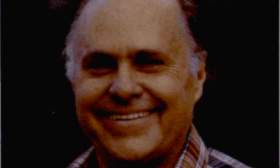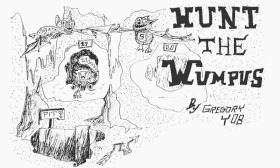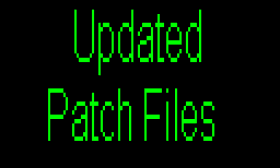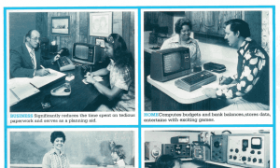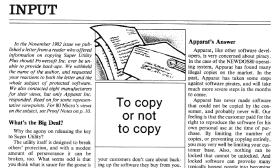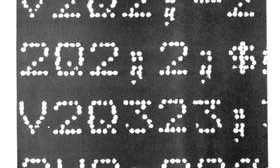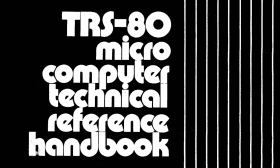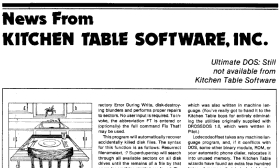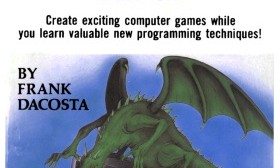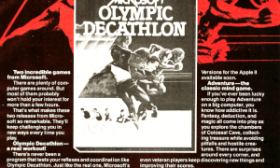I was saddened to learn that Wayne Green died on September 13, 2013. Longtime TRS-80 enthusiasts will remember Wayne Green as the founder and publisher of 80 Micro, the most famous and best remembered TRS-80 magazine.
Wayne Green had a long history in publishing. He began his first newsletter, Amateur Radio Frontiers, in 1951, reflecting his lifelong interest in amateur radio (his callsign was W2NSD). He became editor of CQ, an amateur radio magazine, in 1955. He started his own amateur radio magazine, 73 (also called 73 Amateur Radio Today), in 1960. 73 was his longest running magazine, continuing until 2003.
(Read more...)
Hunt the Wumpus, also known as
Wumpus 1 or simply
Wumpus, was an important early computer game. It was written by Gregory Yob in either 1972 or 1973.
Hunt the Wumpus was one of the first games to allow the player to move around a series of interconnected rooms. Although not an adventure game itself, it influenced the text adventure games that followed.'
(Read more...)
Garry Howarth recently discovered a bug in my LS-DOS 2012 date extension patches. He found a particular disk that would crash the DIR command after installing the date extension patches.
As it turned out, displaying a directory of a disk containing a large file with directory extents on different sectors could sometimes overwrite the patch code, leading to a crash. I needed to rearrange the DIR patch code to avoid this potential problem. This required a new version of the LS-DOS date extension patches.
(Read more...)
August 3 marks the 46th anniversary of the introduction of the Radio Shack TRS-80 Microcomputer System, a significant date in the history of personal computers. The TRS-80, later known as the TRS-80 Model I, was one of the first mass-marketed, fully-assembled computers and it dominated the early microcomputer market.
(Read more...)
Software piracy and copy protection were hotly debated issues during the early years of the TRS-80 software market. Piracy was blamed (not entirely fairly) for lost sales and the decline of the TRS-80 games market in 1982. As a result, a good percentage of TRS-80 games were copy protected.
(Read more...)
Classical Mosquito! was a record of “neo-Baroque” music played entirely by a TRS-80 Model I. It was created by Robb Murray in 1983 and was one of the earliest records consisting solely of computer generated music.
The Kids’ World Almanac of Records and Facts in 1985 described
Classical Mosquito! as “the first commercial record made entirely by computer.”
(Read more...)
The
TRS-80 Micro Computer Technical Reference Handbook (catalog number 26–2103), more commonly called the
TRS-80 Technical Reference Handbook (even in the Radio Shack catalog), was the official technical reference manual for the TRS-80 Model I. The first edition, which cost $9.95, was printed in 1978. A second edition, revised to reflect later updates to the Model I, was printed in 1982 (one year after the Model I was discontinued).'
(Read more...)
One of the most popular columns in the TRS-80 magazine 80 Microcomputing wasn’t about the TRS-80 at all. In fact, despite appearing to be a news column, it wasn’t about real products or companies. It was “News From Kitchen Table Software, Inc.”, a very amusing humor column introduced by David Busch in the July 1981 issue.
“News From Kitchen Table Software” followed the fictional company Kitchen Table, Inc. (also known as KTI), described as “United States’ largest fictitious supplier of space-age computer products.” Kitchen Table was founded by the equally fictitious Scott Nolan Hollerith.
(Read more...)
Adventure games were some of the earliest games written for computers and they were incredibly popular at the beginning of the microcomputer revolution. Despite this popularity, there were only a handful of books that showed how adventure games worked in detail or how to write one. In my opinion, the best book of this type was Writing BASIC Adventure Programs for the TRS-80 by Frank DaCosta. Published in 1982 by TAB Books, Writing BASIC Adventure Programs for the TRS-80 describes two different types of adventure games, with full listings that the reader could type in to the computer. (Both programs were also available through the mail from the author for $19.95 on either disk or tape.)
DaCosta devotes the main part of the book (the first ten chapters) to Basements and Beasties, a classic text adventure in the mold of William Crowther’s original Adventure. After describing how an adventure game works in general, DaCosta lays out the framework needed for a text adventure.
(Read more...)
Olympic Decathlon, sometimes known as Microsoft Olympic Decathlon, was one of the first sports related programs to mix game and simulation. It was written by Timothy W. Smith and sold by Microsoft Consumer Products. The original TRS-80 version cost $24.95 and was released in 1980. It was followed by an Apple II version in 1981 and an IBM PC version in 1982. Although the program used both the word “Olympic” in its title and the Olympic rings symbol, the program manual makes no mention of a license from the International Olympic Committee. The lack of a license might be why the 1982 IBM PC version was renamed Microsoft Decathlon and all references to the Olympics were removed.
Contrary to what is sometimes claimed, Olympic Decathlon was not based on the similar Konami arcade game Track and Field, but actually predated it by several years. Olympic Decathlon was created by Timothy Smith, a former systems programmer for Burroughs Corporation. Smith wanted to write a sports game, but didn’t want to pick an obvious sport such as baseball or basketball. Instead, he chose to base a game on the decathlon, a grueling two-day competition that is comprised of ten track-and-field events:
(Read more...)
